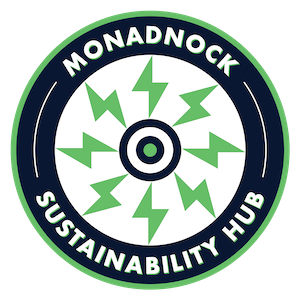By MSH Board Member, Peter Wotowiec.
Originally Published in The Monadnock Shopper News, Green Monadnock column, Spring 2020.
With a handful of dark spongy soil in his gnarled hand, Grandpa told us, “This soil is like a bank account; you have to add to it as you take from it. Always remember to keep the organic matter and nutrient levels up. If you do that right, this black earth will sustain you always.”
We have not followed my Grandpa’s advice. Though conservation practices have slowed the trend, farmland in the United States loses soil around 10 times faster than natural forces are able to rebuild it. And, the eroded soils that are left have lost half or more of their original carbon stock. Organic matter in conventionally farmed fields is shockingly low compared to nearby untilled fence rows.
Soil organic matter is a complex mixture of living and dead plant and animal matter in various stages of decay. It is largely carbon-based. It provides food and a home for soil organisms, retains water, holds on to nutrients and resists erosion. Soil organic matter improves crop health, drought resistance and boosts yields. Adding carbon to soils leads to better and more resilient crops.
This vast soil carbon bank account has been sorely neglected, overdrawn, eroded and impoverished, but change is coming. There is a worldwide movement to reconsider the soil bank account as a tool in the fight to control carbon emissions affecting our changing climate.
The soil carbon bank is said to be 2 to 3 times larger than all carbon found aboveground in the air and in living beings. And there is room for lots more carbon in our agricultural soils. So, why not revitalize the soil carbon bank account and refill it to full balance?
There are many names for this carbon farming idea; soil recarbonization, regenerative agriculture, soil regeneration and so on. The basic idea is simple; add extra carbon back to the soil bank while gaining better crop health and resilience. Keep the carbon in the soil by minimizing tilling and direct exposure to air.
Scientists believe adding carbon to soils will help moderate rising carbon levels in the air but would be ineffective by itself without also cutting the generation of greenhouse gas emissions. Effective action on climate change must come on many fronts!
You can help rebuild the soil carbon bank! Compost your food and organic waste so that it ends up in the soil rather than the landfill. You can simply do this in a backyard compost bin; turn it a few times and, when finished, spread the rich black mulch on your garden or shrubs. Or sign up with a food waste collection service like the Elm City Compost Initiative. Collect leaves and organic yard waste to compost at home or add it to the town transfer station compost pile. Buy from local farmers and ask them how they are building up the carbon in their soil.
If you have a garden, the most important thing to remember is that soil carbon is released when exposed to air. So reduce your tilling and soil turnover. Try an experiment with no-till gardening. Pile on enough mulch that weeds cannot grow through and let it rot to provide nutrients. Always cover the soil in your garden; replant immediately, or plant cover crops. Cover and feed your soil by mulching with ample compost and manure. And always use organic practices that do not harm the multitude of organisms in the living soil.
So dear Grandpa, you were right so many years ago. Thanks for your many hands-on farming and life lessons!
About the Author
Peter Wotowiec serves on the board of the Monadnock Sustainability Hub, a nonprofit citizen organization that collaborates with people, actions & initiatives to strengthen the sustainability and resilience of our region. Peter is a carpenter, farmer, community volunteer and active supporter of the many local eco-action groups. He resides along the Cold River in Langdon, New Hampshire.
Sources:
Soil as Carbon Storehouse: New Weapon in Climate Fight? Yale School of Forestry and Environmental Studies.
https://e360.yale.edu/features/soil_as_carbon_storehouse_new_weapon_in_climate_fight
Can American Soil Be Brought Back to Life? Politico Magazine
https://www.politico.com/agenda/story/2017/09/13/soil-health-agriculture-trend-usda-0005135
Soil Organic Matter Fact Sheet Cornell University Cooperative Extension
http://franklin.cce.cornell.edu/resources/soil-organic-matter-fact-sheet
